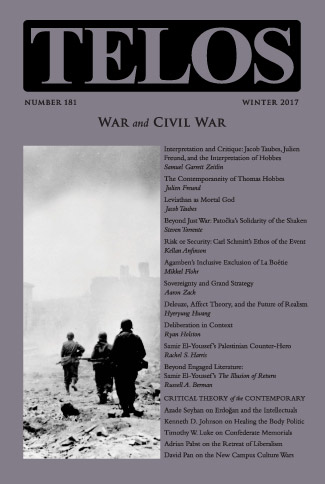Kellan Anfinson’s “Risk or Security: Carl Schmitt’s Ethos of the Event” appears in Telos 181 (Winter 2017). Read the full article at the Telos Online website, or purchase a print copy of the issue in our online store. Individual subscriptions to Telos are now available in both print and online formats.
 This article audits Schmitt’s theory of politics through the concept of the event, particularly the risk it entails. I use Deleuze and Guattari’s notion of a “machine” to build on Michael Marder’s reading of the event in Schmitt, which envisions politics as unstable and open to transformation. Attending to flashpoints where Schmitt limits the potential of these transformations reveals two ways of orienting oneself toward political events: security or risk. Schmitt pushes decisions in the direction of security. But according to Schmitt’s argument that definitions of the political are also political, Schmitt’s attempt to limit the shape that political transformations take is polemical rather than analytical. Reading his theoretical analysis against such polemical interjections reveals the possibility of political partisanship as civil disobedience in which one gives up security and accepts the risk of placing oneself outside the legal order. While those focused on security will likely respond to political events with conservative consolidations of power, civil disobedience engages the risky side of them to express the urgency of the situation. His diversion of political risk is not limited to questions of partisanship, but encompasses the general problem of heterogeneous political interests within the state. I argue that his preference for the homogeneity of democracy over the heterogeneity of liberalism is primarily about controlling the risk of plural interests within the state. Thus while Schmitt attends to the inevitability of risky political events, he tries to contain and direct them in politically conservative ways.
This article audits Schmitt’s theory of politics through the concept of the event, particularly the risk it entails. I use Deleuze and Guattari’s notion of a “machine” to build on Michael Marder’s reading of the event in Schmitt, which envisions politics as unstable and open to transformation. Attending to flashpoints where Schmitt limits the potential of these transformations reveals two ways of orienting oneself toward political events: security or risk. Schmitt pushes decisions in the direction of security. But according to Schmitt’s argument that definitions of the political are also political, Schmitt’s attempt to limit the shape that political transformations take is polemical rather than analytical. Reading his theoretical analysis against such polemical interjections reveals the possibility of political partisanship as civil disobedience in which one gives up security and accepts the risk of placing oneself outside the legal order. While those focused on security will likely respond to political events with conservative consolidations of power, civil disobedience engages the risky side of them to express the urgency of the situation. His diversion of political risk is not limited to questions of partisanship, but encompasses the general problem of heterogeneous political interests within the state. I argue that his preference for the homogeneity of democracy over the heterogeneity of liberalism is primarily about controlling the risk of plural interests within the state. Thus while Schmitt attends to the inevitability of risky political events, he tries to contain and direct them in politically conservative ways.








